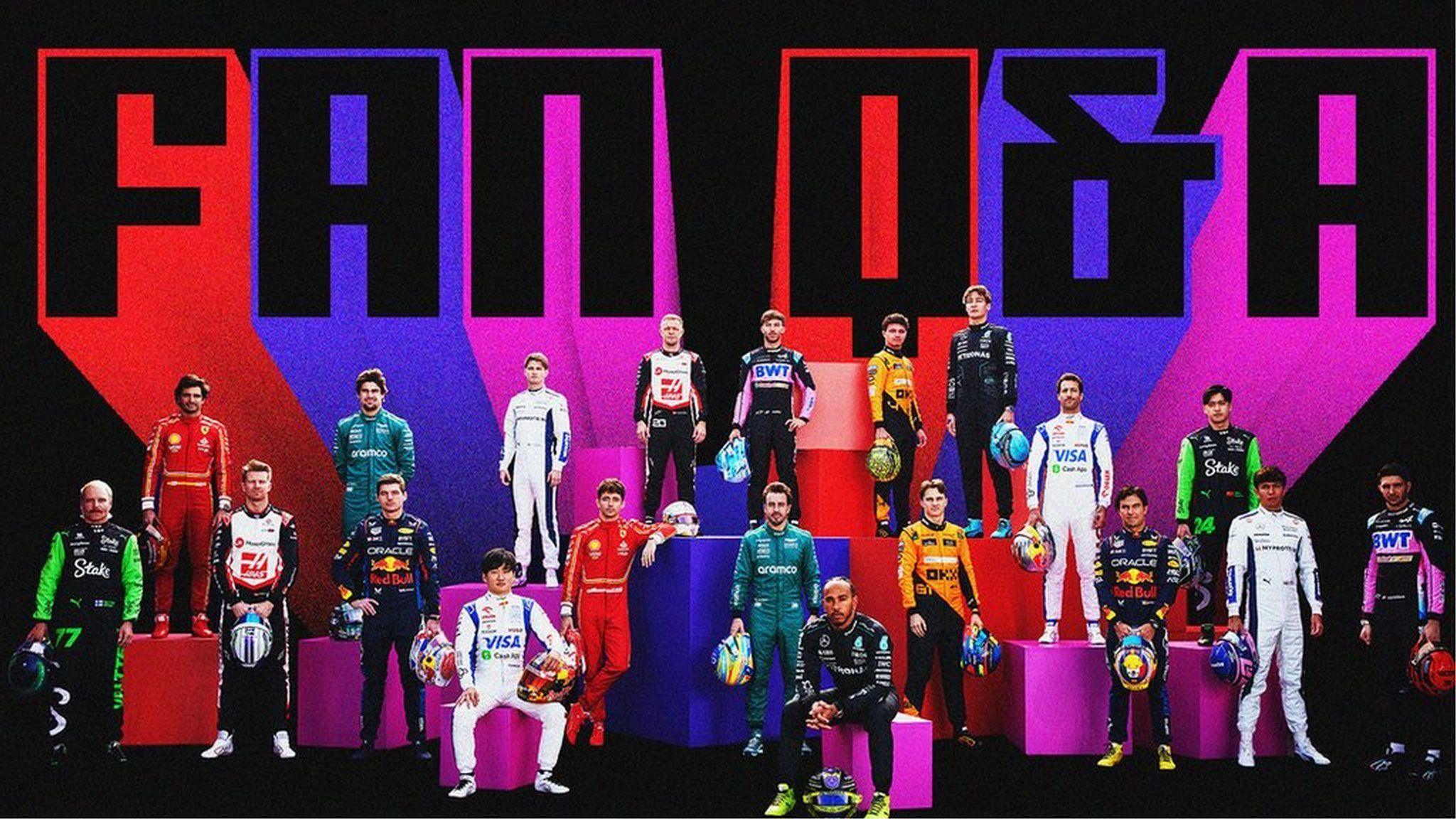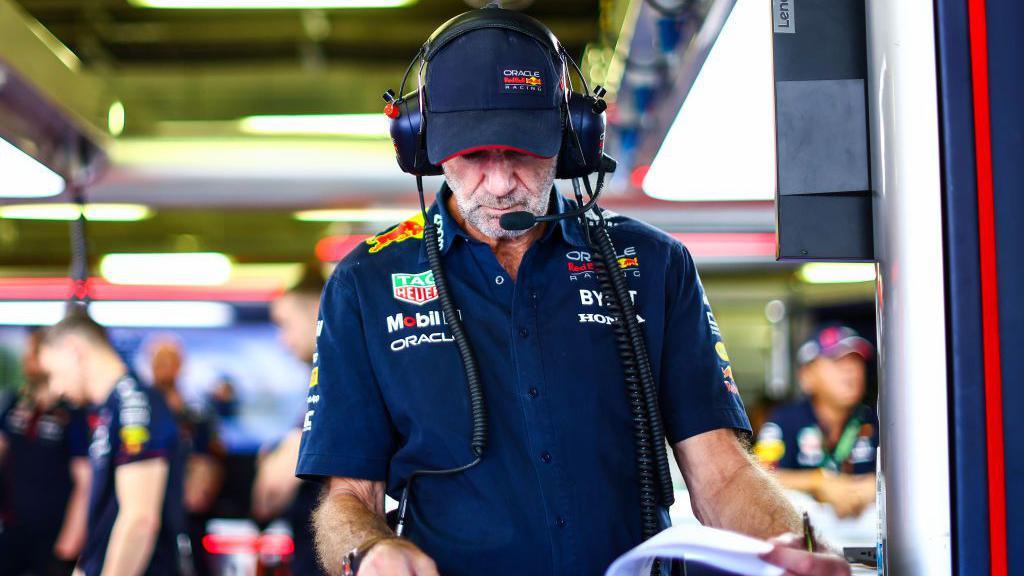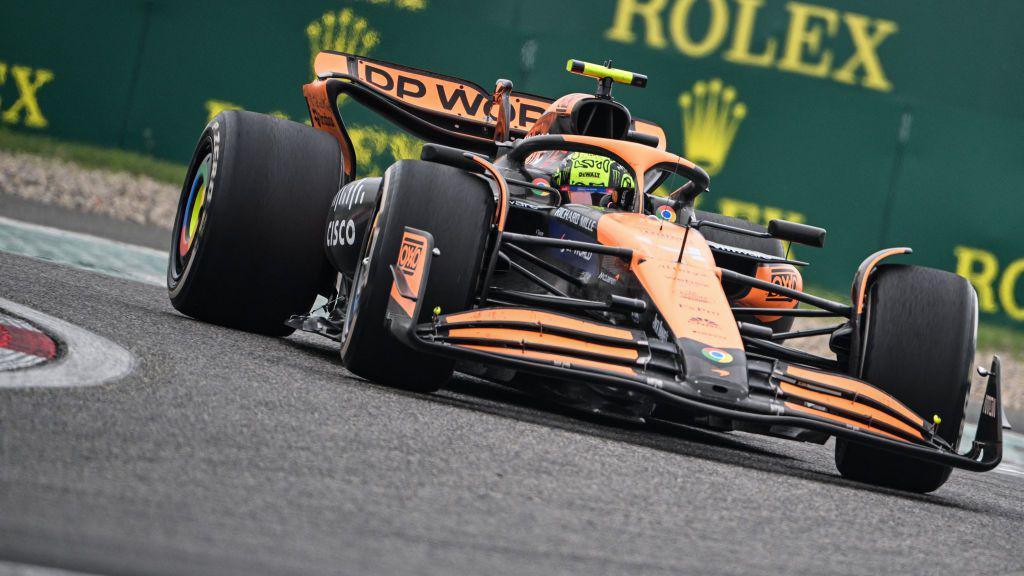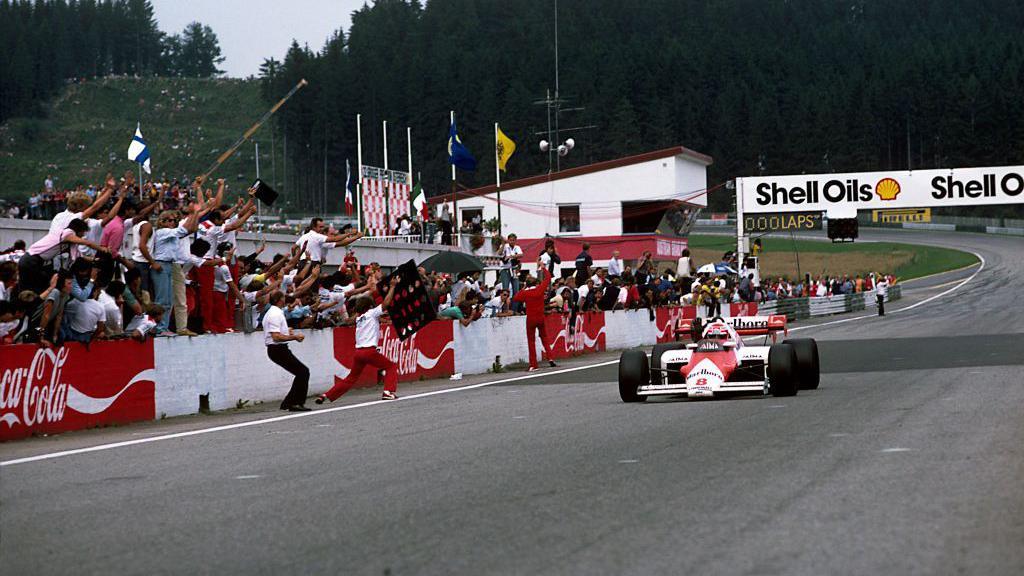Where next for Newey? Your questions answered before Miami GP

- Published
Formula One heads to Florida for the sixth race this season.
It will also be another sprint race weekend at the Miami Grand Prix. Max Verstappen won the first sprint in China, last time out.
The race weekend usually sees numerous famous names in attendance.
Before last season's race, rapper and actor LL Cool J introduced the drivers like they were boxers before a big fight.
BBC Sport's F1 correspondent Andrew Benson answers your questions.
Where do you most likely see Adrian Newey headed after Red Bull and will his impact be as significant a loss for the team as some have made out? – James
Newey’s decision to leave Red Bull, reported by BBC Sport last week, is one of the most seismic events to happen in Formula 1 for a long time.
That’s not just for what it says about the internal issues at the team in the wake of the allegations of sexual harassment and coercive, abusive behaviour made by a female employee against Christian Horner, which the 50-year-old team principal denies.
But also because of the impact it will likely have on the team he leaves and the team he chooses to join.
Newey is rightly regarded as the greatest F1 designer in history so, even if he is not full-time on F1 these days, he will have a huge impact on any team he joins, and losing cannot but hurt the one he leaves. You can see the effect his setting the concept of the latest generation of Red Bulls has had on them.
He has been made offers by Ferrari and Aston Martin. I’m told by sources close to him that he is seriously considering Ferrari but is not interested in going to Aston Martin.
But I would not rule out someone else coming in for him. Not every team could afford him. But McLaren and Mercedes certainly could - and going there would be less disruptive domestically to Newey, even if it would not have the same romantic draw as Ferrari.

Adrian Newey joined the Red Bull team in 2006
Has Lewis Hamilton’s ability deteriorated or are his current struggles more reflective of the Mercedes car? – Alex
Hamilton is suffering the worst start to a season in his career this year but it would be misguided and premature to draw a conclusion as to any decline in his ability as a result. And, after all he has achieved, I suspect he would find it somewhat disrespectful if you were to ask him that question yourself!
His performance in wet qualifying and then the sprint race in China showed he still has all his old qualities. Remember, this Mercedes is the fifth fastest car in qualifying on average, and he stuck it second on the grid in the wet and, arguably more impressively, hung on to that position over 19 laps in the dry, having initially grabbed the lead from McLaren’s Lando Norris at the first corner.
But he definitely needs to find some consistency this season. Stopping making wild set-up gambles in search of a magic bullet that probably is not there, some would argue would be a good start.
Hamilton's desire to compete is as strong as ever. And as his old rival Fernando Alonso has demonstrated so powerfully, if the desire is there, there is no reason for the ability to wane.
McLaren’s return to form over the past three or four years has been impressive. How close are they to returning to the very top on a regular basis? – Ashley
McLaren - and lead driver Lando Norris - have been pointing out repeatedly this year that they have developed more than any other team in the past 12 months.
This is completely accurate - but it is also fair to say that they needed to.
They started the 2023 season towards the back. Their lack of performance, and particularly their lack of development, over the months preceding that point is what led to the major structural changes in the team over the winter of 2022-23 - for example, Andrea Stella being promoted to team principal and technical director James Key being ousted.
Since then, Stella has done an impressive job of getting McLaren back on track. For quite some time over the second half of last season, they were Red Bull’s closest challengers, until Ferrari’s late revival. They have started this season as the third-fastest team on average - and they flat beat Ferrari in China last time out.
How close are they to becoming the team to beat? To do that, they have to catch and overtake Red Bull. McLaren are as aware of this as anyone.
Can they do it?
This is what Stella said after the race in China: “If we take the 12 months period, we have developed more than anybody else. Red Bull did not develop very much last year and clearly they were working quite a lot in the background because they innovated the car dramatically, and to innovate like they did takes months of redesign.
“Then, when they came with the new car, it was a big step. We lost some ground because we gained so much ground before while they were not developing.
“That’s why we have to look at things over the long period, and over that long period we are on a strong trajectory. If we keep this strong trajectory for the next 12 months, why not? We may reach Red Bull.”

McLaren are currently third with 96 points in the constructors' championship
Are there too many rules & regulations imposed by the FIA (both car design & racing) and would simplifying them make the sport more exciting? – Alex
Over time, a number of designers have suggested that rather than write such restrictive rules, the FIA might be better setting a series of parameters and letting the designers do what they want within them.
The reason that does not happen is the fear that one team will get a march on the others and lock in advantage their rivals can’t overturn.
You might well argue that is what has happened with Red Bull in the last couple of years, of course.
It’s a somewhat romantic idea to free up the rules, but it’s not very likely to happen. Not least because it is somewhat against the trend of modern motorsport.
Nor is this a major topic in F1 right now - or indeed for as long as I can remember.
The biggest concern among engineers currently is the 2026 rules and what is looking like a bit of a mess.
In essence, a couple of years ago the power-unit manufacturers came up with a set of engine rules that created a new engine with a much greater proportion of its power coming from the hybrid elements - up to about 50% rather than the approximately 20% now.
But they also took away one of the two means by which the engines regenerate energy, making them much less efficient.
This has created a major conundrum for the chassis rules, which are being finalised right now.
The issue is that it is proving very difficult to recover sufficient energy for the engines, and moveable aerodynamics to increase speeds on the straights is the likely solution. Even then, they are falling short.
Some say that the only way to manage it would be to allow energy recovery from the front axle. But the FIA is resisting this at the moment. The deadline for the rules to be finished is the end of June and right now few engineers are confident a satisfactory solution has been found.
With Nico Hulkenberg moving to Sauber next season (to be Audi in 2026), what does that mean for the rest of the driver market? – Chris
The big question about the driver market still revolves around Max Verstappen’s future - will he stay at Red Bull or not?
Red Bull emphasise he is under contract until 2028, but it is no secret that he and his management have been unsettled by the controversy over Christian Horner, nor that Mercedes are keen to entice him to join them for 2025 or 2026.
Among the top teams, seats are available at Red Bull and Mercedes. As Mercedes team principal Toto Wolff said in China, it is likely that nothing will move until the Verstappen question is resolved.
Sauber/Audi is a minor player in this market, although it could well be that their number one target, Carlos Sainz, feels the need sooner or later to commit to them rather than waiting in the hope of a Red Bull or Mercedes drive that may not come - neither seems that interested in him - and risk being left with nothing.
Which previous F1 track would you most like to see the sport return to and why? – George
You could say this question is somewhat serendipitous because, as it happens, I’ve just finished writing a book about racetracks around the world - it will be out later this year.
The obvious - and cliched - answer is the fabled Nurburgring Nordschleife, but that is so far out of the realms of possibility as to be impossible, however much one might wish it.
The same would apply to Charade - otherwise known as Clermont-Ferrand - a stunning road course in the Massif Central that held four French Grands Prix between 1965 and 1972.
I’m tempted to say Watkins Glen, home of the US Grand Prix East for 20 years from 1960-80. But the track that really caught my admiration growing up was the Osterreichring.
This was a much longer, faster circuit on the site of the Red Bull Ring, which hosts the Austrian Grand Prix. The new track shares the fundamental shape of the old one, but not much else.
The Osterreichring was a truly magnificent track, fast and flowing, with two iconic, banked, fast corners - the Bosch Kurve and Rindt Kurve. And in gorgeous scenery, of course - one thing the modern track does share with it.
To see a modern F1 car around there would be truly something else.

The Osterreichring hosted the Austrian Grand Prix from 1970 to 1987